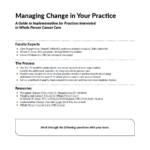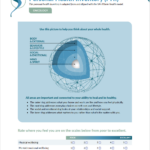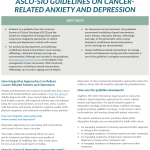“In some practices doing more whole person care with personalized care plans is prioritized to address patient specific side effects. Before treatment starts and armed with the list of potential side effects from the informed consent process, the care team asks what from the list most concerns the patient. An advocate, family member or not, is present for this discussion. From there, that most concerning item is addressed. For Jan, it was time toxicity, not concern for the direct side effects of chemotherapy. For another, it might be a needle phobia. Or hair loss. Neuropathy, brain fog, or weight gain or loss. The care team then takes time to address the most concerning issue or highest stake potential side effect up front, even before treatment starts.” — Healing and Cancer
In the throes of cancer treatment, patients find themselves coping with a variety of side effects. From brain fog to fatigue to gastrointestinal issues, conventional treatments such as chemotherapy, radiation, and surgery can cause a myriad of side effects. Patients are often prescribed medications to manage these side effects, but many of those drugs come with side effects of their own.
By incorporating non-drug approaches such as acupuncture, yoga, and chiropractic care, and also encouraging lifestyle approaches such as nutrition and movement, patients’ quality of life and overall wellbeing will improve. These practices are not limited to time in active treatment—patients can benefit from these practices beyond cancer care.
A recent study published in the Journal of Oncology found that complementary and lifestyle therapies such as nutrition and exercise had a positive impact on patients’ survivorship. The study screened breast cancer patients and oncologists and found that hospitals that offered integrative services with conventional treatments increased survival rates for the patients.
For patients going through active treatment, issues with sleep, stress, and other side effects can have an impact on wellbeing, and that can contribute to how the body responds to conventional treatments. By engaging patients and educating them about evidence-based practices such as nutrition counseling, exercise counseling, psycho-oncology support, patient support groups, and spiritual needs, patients will feel empowered to take back some control and support their healing and quality of life during cancer treatment and beyond.
Here are some additional resources that will help your team to support patients as they go through cancer treatments:
- Pocket guide pdfs to use with your patients*,
- Treatment Guidelines
- ASCO/SIO guidelines: New Guidelines for Integrative Care of Cancer-Related Anxiety and Depression
- ASCO/SIO guidelines: New Guidelines for Integrative Care of Cancer-Related Pain
- The NCCIH just produced a Clinician Digest on the following approaches: Acupuncture, hypnosis and relaxation techniques, massage therapy and reflexology, mindfulness-based stress reduction, tai chi and qigong, yoga therapy, and music-based interventions.
- Patient Resources on the How We Heal Campaign website*
- Healing Works Foundation’s searchable resources database
Personalized Care Across the Cancer Journey
Resources
Latest Blog Post
Healing the Healer: How to Conquer Burnout through Self-Care
When Wayne B. Jonas, MD, started practicing medicine in 1981, he was the only physician responsible for two entire battalions…






